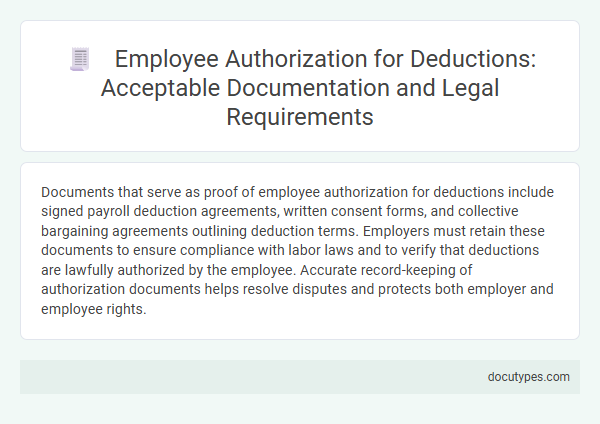Documents that serve as proof of employee authorization for deductions include signed payroll deduction agreements, written consent forms, and collective bargaining agreements outlining deduction terms. Employers must retain these documents to ensure compliance with labor laws and to verify that deductions are lawfully authorized by the employee. Accurate record-keeping of authorization documents helps resolve disputes and protects both employer and employee rights.
Introduction to Employee Authorization for Deductions
Employee authorization for deductions is a critical aspect of payroll management ensuring compliance with legal and organizational policies. Understanding which documents serve as proof helps maintain transparency and protect both employer and employee rights.
- Written Consent Form - A signed document by the employee explicitly authorizing specific deductions from their wages.
- Employment Agreement - An official contract detailing agreed-upon deductions as part of the terms of employment.
- Directives from Legal Authorities - Court orders or government notices that mandate certain deductions, serving as valid authorization.
Legal Framework Governing Payroll Deductions
The legal framework governing payroll deductions ensures that employers have proper documentation before withholding any amount from employee wages. Documents such as signed authorization forms or collective bargaining agreements serve as proof of employee approval for deductions.
You must retain these documents as they provide legal compliance and protect against disputes. Federal and state labor laws regulate which deductions are permitted, making the presence of clear authorization essential for lawful payroll processing.
Types of Deductions Requiring Employee Authorization
Which documents serve as proof of employee authorization for deductions? Employee authorization for deductions is typically documented through signed consent forms or payroll deduction agreements. These documents ensure that you have explicitly approved each deduction from your wages.
What types of deductions require employee authorization? Voluntary deductions such as health insurance premiums, retirement plan contributions, and union dues necessitate your written consent. Mandatory deductions like taxes and court-ordered garnishments generally do not require separate authorization.
Acceptable Documentation for Employee Consent
Acceptable documentation for employee authorization of deductions includes signed written agreements or consent forms explicitly detailing the deduction terms. Paystubs or earnings statements that clearly reflect authorized deductions may also serve as proof when coupled with prior employee acknowledgment. Employment contracts or union agreements containing specific deduction clauses are recognized as valid evidence of employee consent.
Electronic vs. Written Authorization: Best Practices
Employee authorization for payroll deductions requires clear and verifiable documentation to ensure compliance with labor laws. Best practices distinguish between electronic and written authorizations, emphasizing security and legal validity.
- Written Authorization - Paper documents signed by the employee remain the most traditional and widely accepted proof of consent for deductions.
- Electronic Authorization - Digital signatures and electronic consent forms must comply with e-signature laws such as the ESIGN Act to be legally binding.
- Record Retention - Storing electronic or written authorization securely and maintaining easy access supports audits and dispute resolution.
Employer Record-Keeping Obligations
Employers must retain documents that verify employee authorization for payroll deductions, such as signed consent forms or wage assignment agreements. Maintaining accurate and organized records ensures compliance with labor laws and facilitates audits or dispute resolution. Proper record-keeping protects both the employer and employee by providing clear evidence of agreed-upon deductions.
Common Legal Pitfalls and How to Avoid Them
Employee authorization for payroll deductions must be documented clearly to comply with labor laws and avoid disputes. Commonly accepted documents include signed deduction agreements, employment contracts, and written consent forms.
Employers often encounter legal pitfalls such as insufficient documentation, unclear deduction purposes, or failure to obtain explicit employee consent. These issues can lead to claims of unauthorized deductions or wage violations. Maintaining thorough, transparent records and obtaining signed authorization before making deductions helps prevent legal challenges and ensures compliance with state and federal regulations.
State-Specific Requirements for Authorization
Employee authorization for payroll deductions requires proper documentation tailored to state regulations. Different states mandate specific forms or written agreements to validate employee consent for deductions.
- California Authorization Form - Requires a clear, written, and signed authorization from the employee specifying the deduction type and amount.
- New York Wage Deduction Agreement - States that deductions must be authorized in writing, itemizing each deduction with explicit employee consent.
- Texas Written Consent - Mandates a signed acknowledgment from employees for voluntary payroll deductions, ensuring compliance with state labor laws.
Employers must verify state-specific documentation standards to legally authorize employee payroll deductions.
Revocation or Modification of Deduction Authorization
| Document Type | Description | Role in Revocation or Modification |
|---|---|---|
| Written Authorization Form | Employee provides explicit consent permitting employer to make payroll deductions. | You can revoke or modify this authorization by submitting a new written notice outlining changes or cancellation of deductions. |
| Collective Bargaining Agreement (CBA) | Union agreement that includes terms for wage deductions permitted for union dues or related fees. | Revocation or modification typically requires negotiation between union representatives and employer, reflecting changes in agreed deduction terms. |
| Payroll Deduction Authorization Letter | Formal letter submitted by an employee specifying consent for specific deductions. | Revocation or adjustments require submitting an updated authorization letter or a clear written statement rescinding previous permissions. |
| Electronic Consent Records | Digital records capturing employee authorization for deductions via online platforms or email confirmations. | Modifications or revocations can be initiated through updated electronic consent or formal digital notice according to employer policies. |
| State or Federal Regulatory Forms | Mandatory forms related to tax withholding and garnishments authorized by law. | Revocation or modification follows legal procedures requiring submission of corrected forms or notices in compliance with regulatory guidelines. |
Which Documents Serve as Proof of Employee Authorization for Deductions? Infographic

